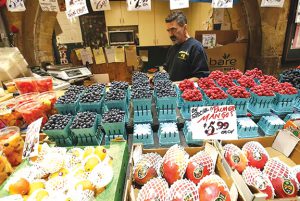Bloomberg
Consumer price inflation accelerated to a four-decade high, adding pressure on the Bank of Canada to deliver more aggressive interest rate hikes in the coming weeks.
Annual inflation rose to 7.7% last month, up from 6.8% in April, Statistics Canada reported in Ottawa. That’s the highest since January 1983 and well above economist expectations for a 7.3% increase. The inflation gauge rises 1.4% from a month earlier with gasoline, hotel rates and cars among the largest contributors to the gains in May.
The average of core measures — often seen as a better indicator of underlying price pressures — rose to 4.73%, a record in data back to 1990.
The report illustrates the urgency for Governor Tiff Macklem to withdraw stimulus from an overheating economy amid concern price pressures are becoming entrenched in economy.
The numbers show an acceleration of price pressures, coupled with a broadening of inflation into other goods and services — a trend that is narrowing the central bank’s ability to maneuver the economy into a soft landing.
Markets are now fully pricing in a 75-basis-point rate hike by the Bank of Canada next month, which would bring its policy rate to 2.25%. That rate is expected to reach as high as 3.5% by the end of this year. Prime lending rates offered by commercial banks are typically a little more than 2 percentage points above the policy rate.
“There was no rest for those of us growing weary of escalating inflationary pressures in May,†Andrew Grantham, an economist at Canadian Imperial Bank of Commerce, said in a report to investors. “The higher than expected inflation figure will have markets pricing an even greater probability of a 75bp hike in July.â€
Asked about the possibility of a super-sized move, Senior Deputy Governor Carolyn Rogers reiterated the central bank needs to continue raising borrowing costs.
“We’ve been clear all along the economy is in excess demand, inflation is too high, rates need to go up,†Rogers said at a conference in Toronto organised by the Globe and Mail newspaper. “We’ll get it there.â€
Prime Minister Justin Trudeau’s government has also been under pressure from opposition parties and economists to do more to stem inflationary pressures and help households offset the cost of living, though his administration has been wary of taking any new measures.
Like other countries, Canadian households are being hit by record gasoline prices, paired with surging food costs.
After a small reprieve in April, gasoline prices shot up again in May, rising 12% during the month and gaining 48% from a year earlier. Food costs rose a smaller 0.8% last month, but are up 8.8% from a year earlier.
The 7.7% annual reading may not even represent the peak, given that gasoline prices have picked up further in June.
There are also more signs that imported inflation is spilling over into domestic price gains, with the cost of services rising 5.2% from a year earlier, the fastest pace since 1991.
Excluding food and energy costs, inflation was also up 5.2% — a three-decade high.
The cost of living is increasing at twice average wage gains in the country, adding a major headwind to the economy.
 The Gulf Time Newspaper One of the finest business newspapers in the UAE brought to you by our professional writers and editors.
The Gulf Time Newspaper One of the finest business newspapers in the UAE brought to you by our professional writers and editors.
